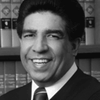P. Scott Neville
P. Scott Neville (Democratic Party) is a judge for the 1st District of the Illinois Supreme Court. He assumed office on June 15, 2018. His current term ends on December 2, 2030.
Neville (Democratic Party) ran for re-election for the 1st District judge of the Illinois Supreme Court. He won in the general election on November 3, 2020.
Neville first became a member of the court by appointment. He was appointed to the position on May 17, 2018, by the Illinois Supreme Court to replace Justice Charles Freeman, who retired on June 14, 2018.[1] As of December 2020, Neville was one of three judges on the court appointed by the sitting supreme court justices. To read more about judicial selection in Illinois, click here.
In 2020, Ballotpedia published Ballotpedia Courts: State Partisanship, a study examining the partisan affiliation of all state supreme court justices in the country. As part of this study, we assigned each justice a Confidence Score describing our confidence in the degree of partisanship exhibited by the justices' past partisan behavior, before they joined the court.[2] Neville received a confidence score of Strong Democrat.[3] Click here to read more about this study.
On September 9, 2025, Neville was elected by his peers to succeed Mary Jane Theis as chief justice of the court. His term as chief began on October 26, 2025, and ends October 25, 2028.[4]
Neville previously served as a judge on the Illinois First District Appellate Court from 2004 to 2018.[5]
Biography
Neville received his undergraduate degree from Culver Stockton College and his J.D. from the Washington University School of Law.[6]
Neville began his legal career as a clerk for Appellate Judge Glenn T. Johnson. Neville was a principal at Neville & Ward, then founded P. Scott Neville, Jr. & Associates, which later merged with Howse, Howse, Neville & Gray. Neville taught at the University of Chicago Law School's Intensive Trial Practice Workshop. In 1999, he was appointed to the Illinois Cook Judicial Circuit Court. He won election to remain on the court in 2000. Neville was then appointed to the Illinois First District Appellate Court in 2004 and elected to remain on the bench in 2012. The Illinois Supreme Court appointed him to the court in 2018, and he was elected to remain on the court in 2020.[5]
Neville previously served as president of the Cook County Bar Association and as chair of the Illinois Judicial Council. He also co-founded the Alliance of Bar Associations.[5]
Elections
2020
See also: Illinois Supreme Court elections, 2020
General election
General election for Illinois Supreme Court 1st District
Incumbent P. Scott Neville defeated Richard Mayers in the general election for Illinois Supreme Court 1st District on November 3, 2020.
Candidate | % | Votes | ||
| ✔ |  | P. Scott Neville (D) | 100.0 | 1,765,329 |
| Richard Mayers (Independent) (Write-in) | 0.0 | 31 | ||
| Total votes: 1,765,360 | ||||
 = candidate completed the Ballotpedia Candidate Connection survey. = candidate completed the Ballotpedia Candidate Connection survey. | ||||
| If you are a candidate and would like to tell readers and voters more about why they should vote for you, complete the Ballotpedia Candidate Connection Survey. | ||||
Do you want a spreadsheet of this type of data? Contact our sales team. | ||||
Democratic primary election
Democratic primary for Illinois Supreme Court 1st District
The following candidates ran in the Democratic primary for Illinois Supreme Court 1st District on March 17, 2020.
Candidate | % | Votes | ||
| ✔ |  | P. Scott Neville | 26.2 | 214,066 |
 | Jesse G. Reyes | 20.3 | 165,344 | |
 | Sheldon Harris | 15.1 | 123,166 | |
 | Cynthia Cobbs  | 12.7 | 103,497 | |
 | Margaret Stanton McBride | 12.4 | 101,475 | |
 | Daniel Epstein  | 8.2 | 66,762 | |
 | Nathaniel R. Howse | 5.1 | 41,205 | |
| Other/Write-in votes | 0.0 | 22 | ||
| Total votes: 815,537 | ||||
 = candidate completed the Ballotpedia Candidate Connection survey. = candidate completed the Ballotpedia Candidate Connection survey. | ||||
| If you are a candidate and would like to tell readers and voters more about why they should vote for you, complete the Ballotpedia Candidate Connection Survey. | ||||
Do you want a spreadsheet of this type of data? Contact our sales team. | ||||
Withdrawn or disqualified candidates
- Clint Krislov (D)
2018
The Illinois Supreme Court appointed Neville to the court on May 17, 2018.[1]
2012
- See also: Illinois judicial elections, 2012
Neville was elected without opposition to remain on the First District Appellate Court on November 6, 2012. He won the Democratic primary, receiving 44% of the vote.[7]
Campaign themes
2020
Ballotpedia survey responses
See also: Ballotpedia's Candidate Connection
P. Scott Neville did not complete Ballotpedia's 2020 Candidate Connection survey.
Analysis
Ballotpedia Courts: State Partisanship (2020)
Last updated: June 15, 2020
In 2020, Ballotpedia published Ballotpedia Courts: State Partisanship, a study examining the partisan affiliation of all state supreme court justices in the country as of June 15, 2020.
The study presented Confidence Scores that represented our confidence in each justice's degree of partisan affiliation. This was not a measure of where a justice fell on an ideological spectrum, but rather a measure of how much confidence we had that a justice was or had been affiliated with a political party. The scores were based on seven factors, including but not limited to party registration.[8]
The five resulting categories of Confidence Scores were:
- Strong Democrat
- Mild Democrat
- Indeterminate[9]
- Mild Republican
- Strong Republican
This justice's Confidence Score, as well as the factors contributing to that score, is presented below. The information below was current as of June 2020.
Ballotpedia Courts: State Partisanship (2020)
P. Scott
Neville
Illinois

- Partisan Confidence Score:
Strong Democrat - Judicial Selection Method:
Elected - Key Factors:
- Was a registered Democrat
- Donated over $2,000 to Democratic candidates
- Received donations from Democrat-affiliated individuals or organizations
Partisan Profile
Details:
Neville was a registered Democrat. He donated $123,101 to Democratic candidates and organizations. Neville received donations from groups that regularly funded Democratic candidates. He was first appointed to the court by the Illinois Supreme Court when the court had a Democratic majority. Neville received an endorsement from the Cook County Democratic Party.
State supreme court judicial selection in llinois
- See also: Judicial selection in Illinois
The seven justices of the Illinois Supreme Court are chosen by popular vote in partisan elections and serve 10-year terms, after which they must compete in uncontested, nonpartisan retention elections to remain on the court.[10]
Supreme court justices in Illinois are elected to represent specific districts. The seven justices are divided among five districts (three allocated to Cook County and the others divided evenly among the other four districts) and are voted into office by the residents of their respective regions.[10]
Qualifications
To serve on the supreme court, a judge must be:
Chief justice
The chief justice of the supreme court is chosen by peer vote to serve a three-year term.[10]
Vacancies
In the event of a midterm vacancy, the Illinois Supreme Court is responsible for appointing an interim justice. If a justice is appointed more than 60 days before the next primary election, the justice must run in a partisan election in the next general or judicial election to remain on the court. The appointed justice's term will end on the first Monday in December after their election. If a justice is appointed less than 60 days before the next primary election, the justice will have to run in a partisan election to remain on the court in the second general election. The appointed justice's term will end on the first Monday in December after their election[10]
The map below highlights how vacancies are filled in state supreme courts across the country.
See also
External links
|
Candidate Illinois Supreme Court 1st District |
Officeholder Illinois Supreme Court 1st District |
Footnotes
- ↑ 1.0 1.1 The State Journal-Register, "Justice Charles Freeman announces retirement from Illinois Supreme Court," May 17, 2018
- ↑ We calculated confidence scores by collecting several data points such as party registration, donations, and previous political campaigns.
- ↑ The five possible confidence scores were: Strong Democrat, Mild Democrat, Indeterminate, Mild Republican, and Strong Republican.
- ↑ ABC 7 Eyewitness News (Chicago, Illinois), "P. Scott Neville Jr. chosen as next chief justice on Illinois Supreme Court," September 9, 2025
- ↑ 5.0 5.1 5.2 Illinois Courts, "P. Scott Neville, Jr.," accessed July 7, 2021
- ↑ [https://chicago.suntimes.com/2020/1/22/21076081/p-scott-neville-jr-illinois-supreme-court-democratic-candidate-2020-primary-election The Chicago Sun-Times, "Candidate profile P. Scott Neville, J," accessed July 7, 2021]
- ↑ Illinois State Board of Elections, "Election Results, 2012, Judicial," accessed July 7, 2021
- ↑ The seven factors were party registration, donations made to partisan candidates, donations made to political parties, donations received from political parties or bodies with clear political affiliation, participation in political campaigns, the partisanship of the body responsible for appointing the justice, and state trifecta status when the justice joined the court.
- ↑ An Indeterminate score indicates that there is either not enough information about the justice’s partisan affiliations or that our research found conflicting partisan affiliations.
- ↑ 10.0 10.1 10.2 10.3 10.4 National Center for State Courts, "Methods of Judicial Selection," accessed September 8, 2021
| ||||||||||
Federal courts:
Seventh Circuit Court of Appeals • U.S. District Court: Central District of Illinois, Northern District of Illinois, Southern District of Illinois • U.S. Bankruptcy Court: Central District of Illinois, Northern District of Illinois, Southern District of Illinois
State courts:
Illinois Supreme Court • Illinois Appellate Court • Illinois Circuit Court
State resources:
Courts in Illinois • Illinois judicial elections • Judicial selection in Illinois







